Orientalism, Occidentalism and Knowing about Others
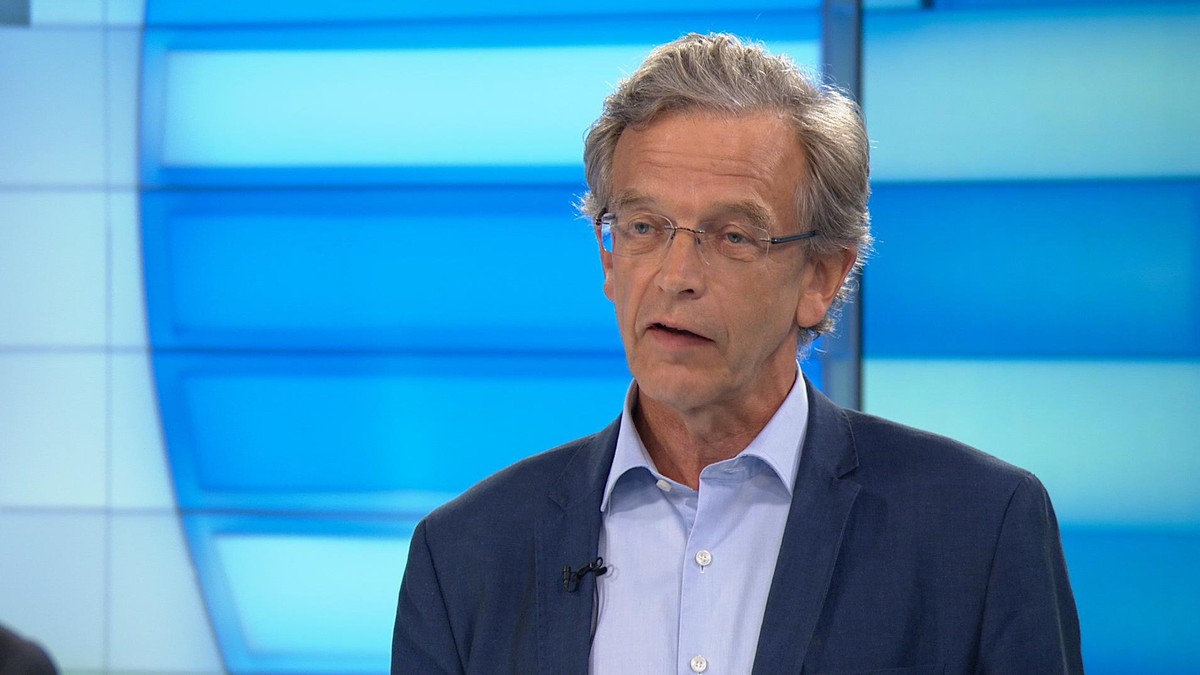
Orientalism, Occidentalism and Knowing about Others
Assuming there really is something we may call a Western cultural hegemony or cultural imperialism, then 'orientalism' is its literary and social scientific form, and 'occidentalism' is a programme for revenge.
Asians and Europeans who study each other are at the same time agents and students of the relationship between East and West. It can, no doubt, be an exchange based on equality and mutual respect, but the danger always exists that studies and research programmes in Europe, the United States, and Australia will represent a continuation of an Orientalist tradition of cultural domination and, consequently, that research centres based in Asia will try to formulate some kind of 'genuinely' Asian approach to culture and science, in opposition to the basic ideas of the Occident.
The present article shall be dedicated to a reflection on the relationship between East and West and the role of researchers and intellectuals in that relationship. Research publications and conferences are today an enormous growth industry and play an increasingly important role in cultural as well as political and economic exchanges between states and regions. Students and researchers in humanities and social sciences cannot conceive of themselves as standing outside the processes they are studying. By virtue of doing what they do they are active participants in the formation of the future of East-West, North-South and global culture.
Imperialism in the Post Cold War World
These last years the East-West relationship has undergone enormous change. I shall mention six processes of change that point in different directions. The first two of them point towards a global culture:
1. Free trade capitalism has triumphed to a degree that only a few years ago was inconceivable. More or less closed economies in the former Soviet Union, India, China, Latin America and a number of African countries have opened up for trade and investments, thus significantly increasing the leverage of international corporations and decreasing the freedom of individual states to defy the interests of international banks and investors.
2. Media and communication networks have created a united world of information, making it impossible to defend one cultural territory from external influence--unless the inhabitants of that territory willingly accept to shield themselves. We live today in a global media capitalism with English as the almost universally accepted lingua franca. A good command of English is a must for all who want to operate on the global arena.
The four remaining processes of change are more equivocal in that they in some ways contradict the globalising trend by setting new obstacles to East-West rapprochement while in other ways contributing to bringing East and West closer together:
3. There has been a shift in the balance of productive force, with economic growth taking place mainly in the Far East. This has created an impression in some Western circles that the East-West historic pendulum that has been swinging steadily westwards since the 14th century has started swinging back towards the East.
4. The end of the Cold War and the fall of all Western communist regimes (except Cuba) has confined communism to the Far East and has supplanted the intra-Western East-West ideological divide with a division between the whole West and the real East. Russia has come out as a crisis-ridden Western democracy while its former Eastern comrade states are prospering economically while remaining authoritarian. The main lines of political conflict in this world no longer split Europe and the West in two but set East and West against each other. It is now the East that is split with a Confucian growth zone in the far end, a populous Hinduist federation in the middle and a fragmented Islamic Near East.
5. In the relationship between the West and the Near East, there was a devastating clash in 1991 the Gulf War followed two years later with a handshake between an English-speaking Jew and an Arab-speaking Palestinian. That handshake took place on Western terms in the garden of the West's most sacred temple with the young archbishop coming out of his oval office to act as broadly smiling conciliator.
6. The sixth change is the one that has most fundamentally contradicted globalisation. It is the almost universal revival of ritual, religion, and tradition. This is a response to globalisation, using the new media to forge cultural protection for imagined communities small and large. Let me illustrate this point with experience from the life of this lecture's main inspirator, the secular anti-imperialist Edward Said. In 1989, he held a lecture at the English Faculty of Cairo University, speaking for an hour about nationalism, independence, and liberation as alternative cultural practices to imperialism. Then he was asked by one of the listeners about 'the theocratic alternative'. He mistakenly understood the questioner as asking about 'the Socratic alternative', but was put right very quickly. The listener was a well-spoken young woman whose head was covered by a veil; Said had overlooked her concerns in his anti-clerical and secular zeal (Edward Said, Culture & Imperialism, London, Chatto & Windus, 1993, pp. 369--70).
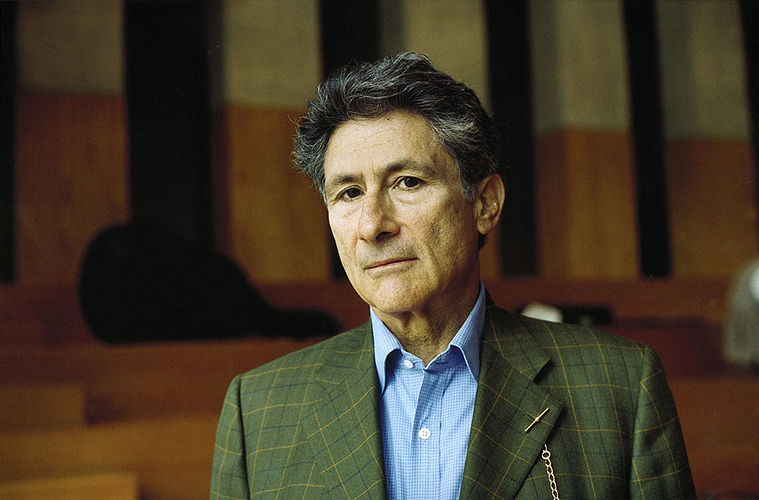
Edward Said
Options
In the present situation of the world, how should "we" (the big global intellectual "we", Westerners and Easterners alike and particularly people like Said with one foot in each camp), relate to the question of East versus West? I see three options: thesis, anti-thesis, synthesis, to use the Hegelian dialectical scheme:
The first option is for those of us who already are Westerners to define ourselves more consciously as such, promote or defend Western values and enlist Eastern converts or clients in the endeavour. Those among us who have sentimental qualms about being Western because of birthplace, skin colour, language or religion, should convert to the Occident because of its superior values: the freedom to say what you want (and sell your soul on TV).
The second anti-thetical option is the opposite one: to engage ourselves as intellectuals in a critical, moral analysis of the centuries-old Western domination of the East while at the same time maintaining a critical distance to repressive social systems in the East.
The third synthetical option will be revealed only at the end of the article. It may not, perhaps, come as a surprise that this is my own choice. Before presenting it as a conclusion, I shall present and discuss one protagonist of the Western and two of the anti-Western stance.
The Clash of Civilisations
My Western man is Samuel P. Huntington, president Lyndon B. Johnson's former national security adviser, author of the highly acclaimed The Third Wave: Democratization in the Late Twentieth Century (Norman, OK, Univ. of Oklahoma Press, 1991), now Eaton Professor of the Science of Government and Director of the John M. Olin Institute for Strategic Studies at Harvard University. Over many years, Huntington has focused on transitions from one political regime to another, particularly from dictatorship to democracy. In 1993, in a programmatic article in the Summer issue of Foreign Affairs which provoked a heated debate through the whole autumn, he tried to formulate a new outlook on the world to replace Washington's lost anti-communism. In the multi-ethnic, missionary political culture of the United States, there is a national need for an orderly world of conflict between good and bad. In his article, Huntington suggests a conflictual order based on the "Clash of Civilizations". The great divisions among humankind and the dominating source of conflict will be cultural, he says: "The clash of civilizations will dominate global politics". He defines a civilization as "the highest cultural grouping of people and the broadest level of cultural identity people have short of that which distinguishes humans from other species." He finds seven or eight such civilizations: the Western (Europe and North- America); the Confucian, the Japanese (which according to Huntington is a society and civilization unique to itself), the Islamic, the Hindu, the Slavic-Orthodox, Latin American "and possibly African". Differences between these civilizations are in Huntington's view more fundamental than differences among ideologies and political regimes. Communists can become democrats, and rich can become poor, but Russians cannot become Estonians or Azeris become Armenians. Huntington furthermore contends that it is differences among civilizations that have generated history's most prolonged and most violent conflicts. At present, according to Huntington, the West is at the peak of its power, but it is confronting non-Wests that "increasingly have the desire, the will, and the resources to shape the world in non-Western ways" ... "The Velvet Curtain of culture has replaced the Iron Curtain of ideology". The West stands against an Eastern economic bloc, likely to be led by China, and the Gulf War was not the world against Iraq (as Bush presented it), but really "the West against Islam". Huntington is bold with words and goes as far as saying: "The next world war, if there is one, will be a war between civilizations". Western culture's influence in the rest of the world is only superficial: "At a more basic level ... Western concepts differ fundamentally from those prevalent in other civilizations. Western ideas of individualism, liberalism, constitutionalism, human rights, equality, liberty, the rule of law, democracy, free markets, the separation of church and state, often have little resonance in Islamic, Confucian, Japanese Hindu, Buddhist or Orthodox cultures .... The very notion that there could be a 'universal civilization' is a Western idea, directly at odds with the particularism of most Asian societies and their emphasis on what distinguishes one people from another". Despite these differences among Asians themselves, Huntington remains convinced that the Asians will find together in a Confucian-Islamic connection to challenge Western interests, values, and power. The West must meet this challenge, says Huntington, by promoting greater cooperation and unity within its own civilizations, and by limiting the expansion of the military strength of Confucian and Islamic states.
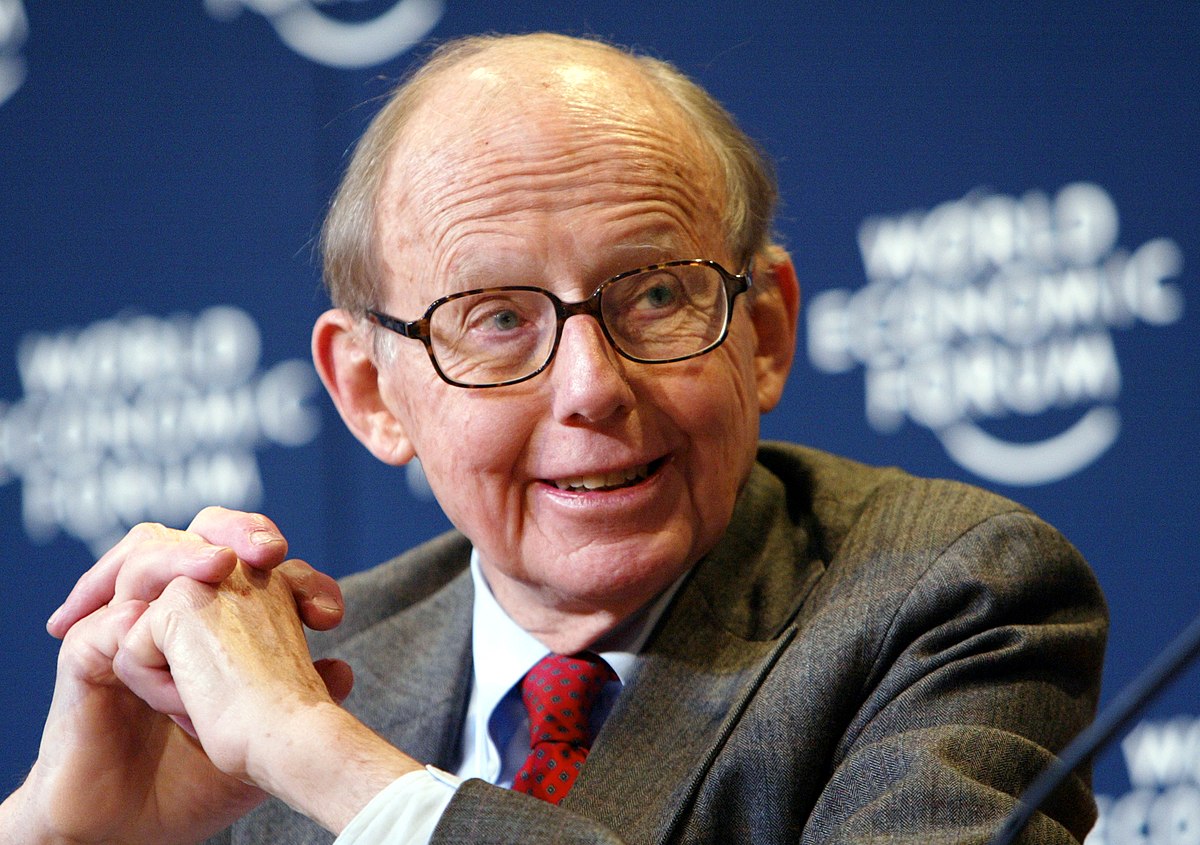
Samuel Huntington
Let me frankly admit that I find Huntington's views frightening, in particular, because they were given such a prominent place in a leading foreign policy journal like Foreign Affairs, and even more because there is a tendency in the Clinton administration to conceive of the world in 'Huntingtonian' terms. Fortunately, the USA is enough of an open society to have given Huntington a lot of backlashes. Already in the Autumn 1993 issue of Foreign Affairs, there were a number of replies. Fouad Ajami correctly asserted that the actors in international politics are states, not civilizations. Nation states will continue to act upon their own interests with little regard for civilizational duties, both in the East and the West: "let us be clear: civilizations do not control states, states control civilizations". Therefore most Arab countries did not even side with Iraq in 1990-91, and would certainly not feel any commitment to supporting Confucians against the West if that was not in their interest. Also Ajami rejected Huntington's idea that Western culture had just had a superficial impact in Asia: "The secular idea, the state system and the balance of power, pop culture jumping tariff walls and barriers, the state as an instrument of welfare, all these have been internalized in the remotest places", said Ajami, from his moderate Islamic standpoint. The same point was made by the Chinese dissident Liu Binyan: "though Confucianism is gradually coming back to China, it cannot be compared to the increasingly forceful influence of Western culture on the Chinese people in the last twenty years."
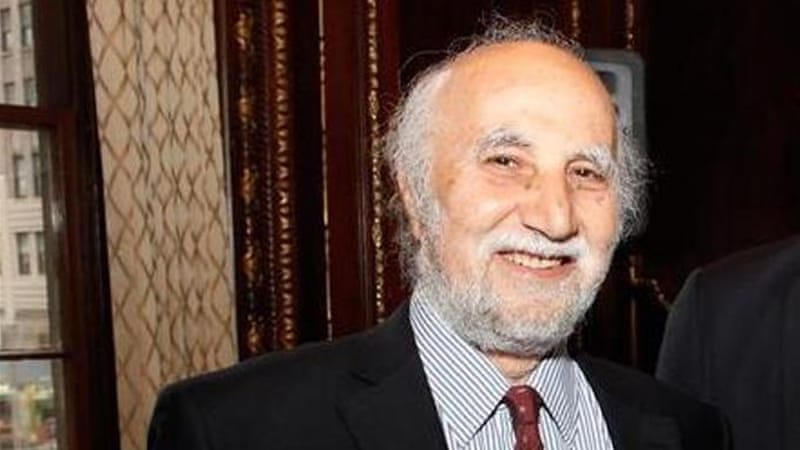
Fouad Ajami
Huntington was also criticised by another scholar based in a Confucian state, Kishore Mahbubani of the Civil Service College, Singapore. He saw Huntington's article as evidence of a dangerous siege mentality: "It will ... come as a great surprise to many Westerners to learn that the rest of the world fears the West even more than the West fears it, especially the threat posed by a wounded West." Mahbubani had some comfort for Huntington: There is no likeliness of a Confucian-Islamic connection, because: "The simple truth is that East and Southeast Asia feel more comfortable with the West." But Mahbubani is concerned on behalf of the West. Through budgetary indiscipline, low savings, an eroding work ethic, lacking leadership and excessive democracy, the West "is bringing about its relative decline by its own hand."
Is there something good to be said about the Huntington debate? Yes, one very good thing. By expressing a crude, almost naivistic, White Anglo-Saxon American outlook on the post-Cold War world, phrased in the bluntest of terms, Huntington forced upon the enormous readership of Foreign Affairs a basic discussion of some of the most crucial issues facing mankind. When reading Huntington and his critics, we are forced to make up our minds about some of our innermost presumptions.
Joseph Conrad and Western Self-Questioning
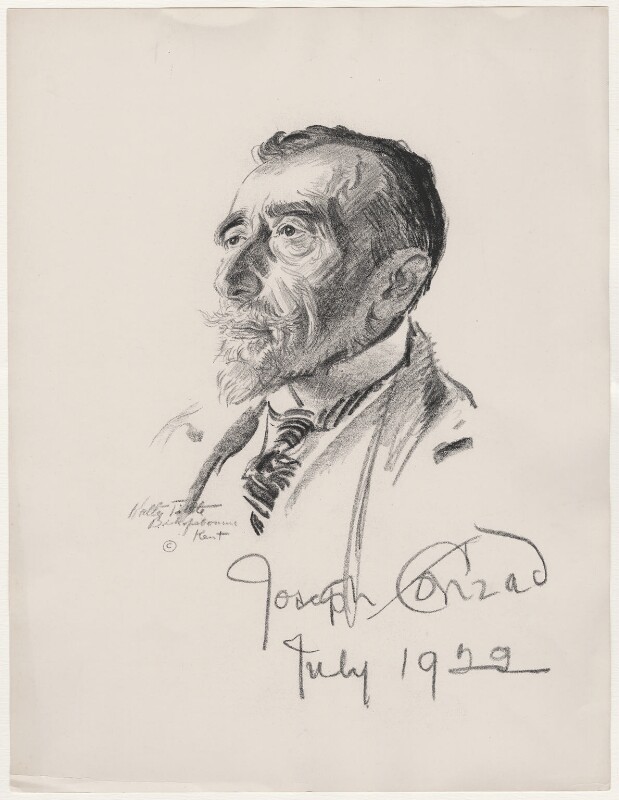
If we move out of solid America and approach the near East, we will find that on the intellectual left, there is a tendency to supplant (подменям) the now mostly defunct criticism of Western economic and political neo-colonialist exploitation of "the third world" with a cultural critique. The main figure here is Edward Said. He has struggled with Western cultural domination of the East and South for a couple of decades already. Said is a man with a double culture: Palestinian, thus Arab and "Oriental", but also Western by virtue of upbringing, career, and expertise in European and American literature. His book Orientalism (Routledge & Kegan, 1978) was a broad attack on French and British expertise on Asia. These "Orientalists" used knowledge and Western-based interpretations to degrade the East in ways that were a cultural pendant to economic and political imperialism. And this did not end with decolonisation, Said argued, but continued in the form of American area studies.
In his latest book, Culture & Imperialism, Edward Said desiccates Western fiction, showing how the great novels of the West reflect Western attitudes towards the East and the South. It is in its dealings with the black South that European domination comes out at its crudest, the worst case being Belgian Congo. In Said's book, the European destruction of the Congo at the turn of the century has come to embody Western inhumanity. The author who, because of his self-dissecting honesty, has come to reveal this inhumanity best, is Joseph Conrad. His The Heart of Darkness was quoted already in Said's book from 1978. In his new book, Conrad appears already on the first page:
The conquest of the earth, which mostly means the taking it away from those who have a different complexion or slightly flatter noses than ourselves, is not a pretty thing when you look into it too much. What redeems it is the idea only. An idea at the back of it; not a sentimental pretence but an idea; and an unselfish belief in the idea something you can set up, and bow down before, and offer a sacrifice to ...
Said is not the only anti-imperialist to quote Joseph Conrad. The Heart of Darkness appears also in the works of two auto-critical European "Saids": the Dutch scholar Jan Breman and the Swedish writer Sven Lindqvist. Breman has published an article on primitive racism in a colonial setting (Jan Breman, ed., Imperial Monkey Business: Racial Supremacy in Social Darwinist Theory and Colonial Practice, Amsterdam, CASA Monographs 3, 1990) Here, Conrad appears with a vivid description of the nameless victims, not of a Belgian "bad beginning", but of the crude ideal type version of Western domination:
Six black men advanced in a file, toiling up the path. They walked erect and slow, balancing small baskets full of earth on their heads, and the clink kept time with their footsteps. Black rags were wound round their loins, and the short ends behind waggled to and fro like tails. I could see every rib, the joints of their limbs were like knots in a rope, each had an iron collar on his neck, and all were connected together with a chain whose bights swung between them, rhythmically clinking ... They passed me within six inches, without a glance, with that complete, deathlike indifference of unhappy savages ...
And Joseph Conrad's Congo novel reappears a third time in the title of Sven Lindqvist's revolt against being European (Utrota varenda jävel, Bonniers, 1992):
The word "Europe" is derived from a Semitic word which means precisely darkness. The phrase that appears on the monitor before me is truly European. The thought had been a long time on its way when it was finally phrased in 1898-99 by a Polish author who often thought in French but wrote in English: Joseph Conrad. The main personality in The Heart of Darkness, Kurtz, concludes his treatise on the civilising mission of the whites among the savages in Africa with a handwritten postscriptum, which summarizes the flamboyant rhetoric's real meaning. It is this phrase that now gleams towards me on the monitor: "Exterminate all the brutes".

Sven Lindqvist
This sentence, in its Swedish translation, "Utrota varenda jävel", became the title of Lindqvist's 1992 book, where he tried to remind the cold war winning west of its past, a shared European past that led directly to the nazi camps. Lindqvist concludes his "Saidistic" book: "Anywhere in the world where there exists a deeply concealed knowledge which, if brought out into the open, would make us conscious, splinter our world view and force us to question ourselves, you find the Heart of Darkness."
Occidentalism
Occidentalism is a positive Arab response to Edward Said's critique of Western Orientalism. The man behind the concept is professor Hassan Hanafi, leader of the Institute of Philosophy of the University of Cairo and a former researcher at the United Nations University in Tokyo. In 1992 he published a book of 881 pages about Occidentalism (Muquaddima fi ilm al-Istighrab [Introduction to the science of Occidentalism]). Hanafi's project is to objectivate the Occident in the same way that Westerners used to do it with the Orient with the purpose of recreating an independent Arabic intellectual tradition. So far the Occident has been the teacher and we the pupils, he says. How long will this tutelage last? And he answers: As long as we consider the West just as a source of knowledge and not as an object of inquiry. Arabs must learn to desiccate the West the same way one does it with mice in the laboratory. Hanafi believes that the West is in decline. Asked by a French journal about Francis Fukuyama's claim that History has come to its end, Hanafi answers: "For Arabs, Africans, Latin-Americans, Asians, History has not ended. It has perhaps not even started" (Interview with Hassan Hanafi in Arabies, 1992). History does not coincide in East and West. For Arabs, the period that Westerners call "middle age" was the real Antiquity. Now there is time for a renaissance.
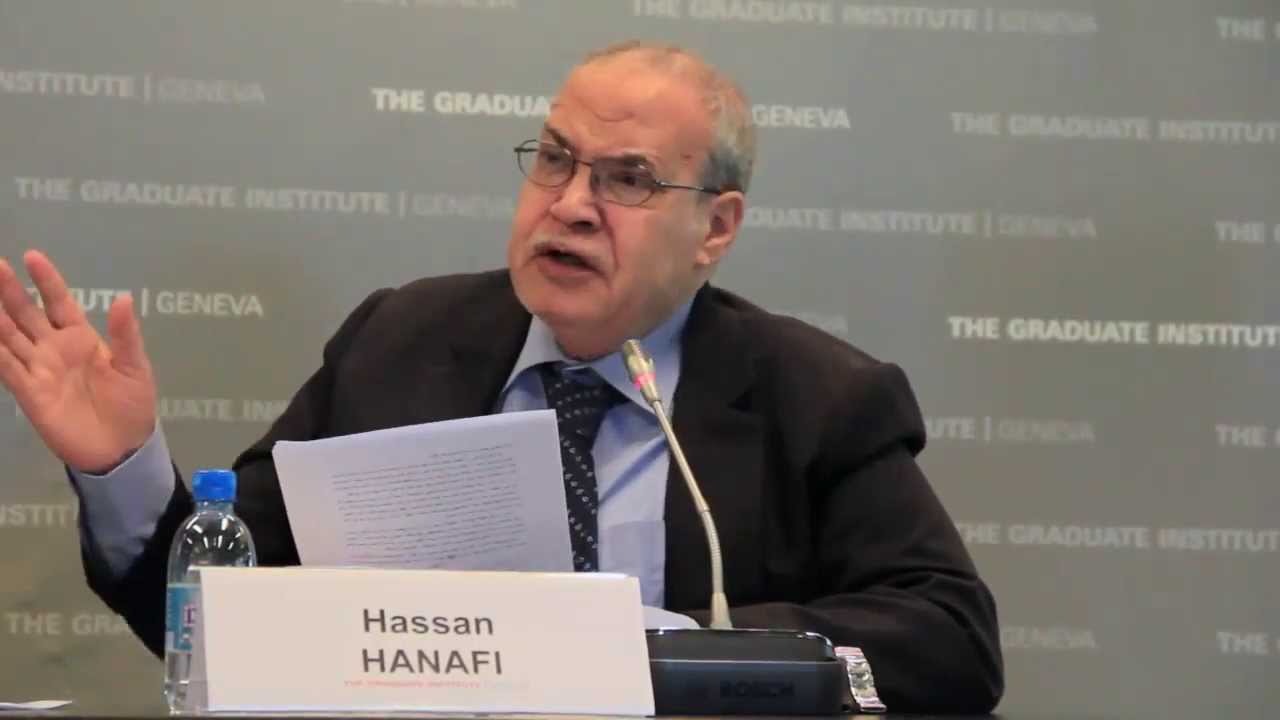
Hassan Hanafi
But Hassan Hanafi does not see the Japanese experience as a source of inspiration: "Japan is a country I know well", he explains, "it is at one and the same time a giant and a dwarf ... in the field of philosophy it is a dwarf. There exists a French, German, Anglo-Saxon philosophy, but no Japanese. It is the most translating country in the world. Translating but not creating." Arabs, however, can be creative if only they are liberated from the mythical domination of the West. Arabs must not be fooled by the idea of a universal culture. The idea of a universal culture is a myth destined to fool the dominated. This has been done by the ancient Egyptian civilization, later by the Chinese, Hindus and by the Occident. Hanafi's project is to desanctify in the eyes of the Arabs the Western gods: Descartes, Kant, Hegel and Marx.
Universalism (all the same)
The third option is exactly the one that Hanafi warns against: to reject the whole East-West dichotomy in favour of a universal approach. East and West have so much in common, and both East and West differ so much internally that any attempt to understand the world from the standpoint of an East-West divide is bound to fail. We should thus reject Samuel Huntington and Hassan Hanafi's contention that humanism always serves as a smokescreen for Western domination. It must be possible to do what Liu Binyan suggests: to use "the best of all civilizations, not emphasizing the differences between them", to promote global civilization, create or build one world on the basis of shared human values, fight exclusiveness and protectionism without also promoting domination. Bridges can be built on the basis of drawings from architects on both sides, and bridges can be crossed by people from both sides. The basic idea behind the humanist approach is that in essence every human being is alike. The differences highlighted by cultural relativists should be seen as exceptions to the general rule, and should never be exaggerated.
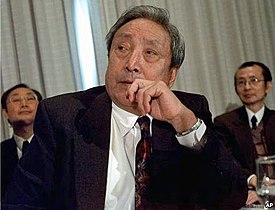
Liu Binyan
I take the liberty of enlisting, without having asked for permission, Edward Said, among the likely supporters of the universalist, cross-cultural enterprise. In his Culture & Imperialism, he laments the loss of something that existed in the Middle East when he knew it as a young man:
My Arab environment had been largely colonial, but as I was growing up you could travel overland from Lebanon and Syria through Palestine to Egypt and points west. Today that is impossible... The past wasn't better, but it was more healthily interlinked, so to speak; people were actually connected to one another, rather than staring at one another over fortified frontiers. In many schools, you would encounter Arabs from everywhere, Muslims and Christians, plus Armenians, Jews, Greeks, Italians, Indians, Iranians, all mixed up, all under one or another colonial regime, but interacting as if it were natural to do so. .... The effort to homogenize and isolate populations in the name of nationalism (not liberation) has led to colossal sacrifices and failures... Identity, always identity, over and above knowing about others. (pages 361-2.)
Towards the end of Said's book, he returns to his wish to place knowing about others on top of the human agenda and puts forward a vision of being perfectly homeless in an open world. This he does by quoting a beautiful passage by a twelfth-century European monk from Saxony, Hugo of St. Victor:
The person who finds his homeland sweet is still a tender beginner; he to whom every soil is as his native one is already strong; but he is perfect to whom the entire world is as a foreign place. The tender soul has fixed his love on one spot in the world; the strong person has extended his love to all places; the perfect man has extinguished his. (page 407.)
This must have been difficult in the 12th century, but might be easier in the age of satellites. The synthetical humanistic option is idealistic, no doubt about that, but it is not devoid of realism: A whole range of powerful forces are on the side of cultural bridge-builders. Let me just name a few: computer industries, English teachers, publishers, travel agencies, international corporations, airway systems, telecommunication companies, high tech capitalism, hotels, international funding agencies, former colonial institutions, refugees and immigrants, culturally mixed restaurants, research networks, and institutes specialising in knowing about others.
2008